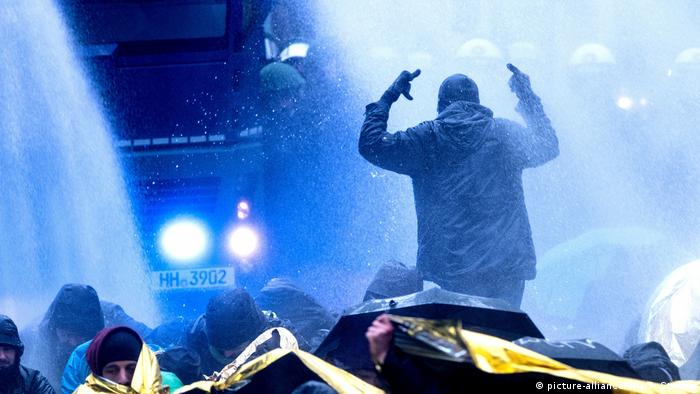Protests against the party conference of AfD (Alternative für Deutschland – Alternative for Germany) in Hannover met violent police repression. During its party conference, AfD elected new leaders, two hardliners whose victory indicates a further drift to the extreme right of the party.

Protests against the party conference of AfD (Alternative für Deutschland – Alternative for Germany) in Hanover met violent police repression. Protesters started to rally on Saturday (2/12/2017) at 6 am to block the access to the party meeting. They gathered on several crossroads in order to obstruct road accesses to the Hanover Conference Center, where the AfD was holding its party conference.
The police used water cannons to disperse the protesters, even though temperatures were close to freezing point, putting people’s health seriously at risk. One protester who was chained to a barrier was broken a leg while being dragged away by the police, as Deutsche Welle reports. 10 protesters were arrested.

Right after having taken part in the blockade, a member of Interventionistische Linke* said “Of course it’s cold, but history has taught us that it’s worth fighting against the right. The day is not over yet. This afternoon we will see the biggest Anti-AfD-protests ever.”
Indeed, five anti-racist and anti-capitalist demonstrations drew around 6500 people to the city centre, gathering Antifa groups, trade unions, youth organisations and others.
The protest actions led to an one-hour delay of the AfD conference that was held in order to elect new party leaders. The election was won by Alexander Gauland as co-leader along with Jörg Meuthen. As compared to the “traditionnally conservative” parts of the AfD, Gauland and Meuthen are said to be right-wing hardliners, and their election indicates a further drift to the extreme right of the party. At the Bundestag elections in September this year, AfD won 13% of the votes with a campaign focused on anti-immigration and anti-Islam. After CDU (Angela Merkel’s party) and SPD (social democrats), it has become the third biggest parliamentary group in the Bundestag.
“We want to stop this rolling snowball before it turns into an avalanche”, says IL-member Ronja Schönberg.
*Interventionistische Linke (IL) was founded in the beginning of the 2000 as a radical left federation of around 30 German and Austrian organisations, among which several Antifa groups. IL tries to set up broad alliances and has become a major organisation of radical left activism in Germany. This can be illustrated by the fact that, in 2015, the German secret service (Verfassungsschutz) ranked IL first among the 19 left extremist groups it is keeping under surveillance.






Comments